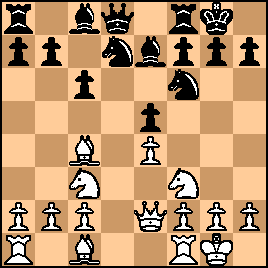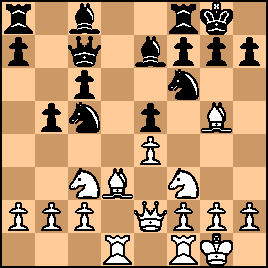| KEG: Not a good game at all. Eisenberg mishandled the White side of a Philidor's Defense and was lost by move 18. Marco, who had resigned in a won position in Round 1, nearly blew this game as well. But some weak endgame play by Eisenberg in the ending eventually handed the win to Marco. Almost as bad as the play was the commentary in the Tournament Book, that completely misunderstood the endgame here. The only real interest was the theme of Bishop vs. Knight domination in the ending Eisenberg allowed Marco to pull this off twice; the second time proving fatal. 1. e4 e5
2. Nf3 d6
3. d4 Nd7
An old variation. It is playable, but Black can get killed quickly, as was proven--for example--in a skittles game Bobby Fischer won against Reuben Fine in 1963. 4. Bc4 c6
"!"--Tournament Book.
Fine's move in his above-mentioned loss to Fischer. It is sound, as is 4...exd4. As the Tournament Book points out, 4...Be7 is bad in light of 5. dxe5 Nxe5 (5...Nb6 and Nc5 are perhaps better, but also seem to lose--KEG; and 5...dxe5 gets killed by 6. Qd5 as noted in the Tournament Book) 6. NxN dxN 7. Qh5 and White winsn a pawn. 5. 0-0 Be7
5...exd4 is better (as Fine played against Fischer--but erred shortly after) 6. Nc3
6. dxe5 is better.
6...Ngf6
Why not 6...b5?
7. dxe5?
7. a4 or 7. Re1 give White a clearedge.
7... dxe5
8. Qe2 0-0

click for larger viewChances here were about equal. But from this point Eisenberg's weak play soon handed Marco a winning game: 9. Bg5?
9. a4 or 9. Rd1 or even 9. b3 were much better.
9... Qc7
9...h6 was best.
10. Rad1
Very weak. White should play 10. a4 to anticipate Marco's next move. 10... b5
"!"--(Tournament Book)
11. Bd3?
"!"--(Tournament Book)
11. Bb3--given a "?" in the Tournament Book, was in fact best. If then 11...a5 as suggested in the Tournament Book, White should play 12. a4 (and not 12. a3 Ba6 as given in the Tournament Book). 11... Nc5
11...h6 is best.

click for larger viewEisenberg's position is constricted, but he was far from lost. But in his next few moves, he ruined any legitimate chances he had. 12. Nh4?
A bad plan. White should play 12. h3 or 12. Qe3 or maybe 12. Bh4. 12... Ne6
Hardly the most dynamic for Black. Better were 12...h6 or 12...b4 or even 12...Re8. 13. BxN
He should have retreated rather than traded off the Bishop. 13... BxB
14. Nf5 g6
15. Ne3 Bg7
16. Qd2 Bb7
17. Ne2 Rad8

click for larger viewDespite all his questionable play to this point, Eisenberg was hardly lost. But in his next several moves, he ruined his already cramped position beyond likely repair. | 




